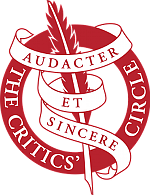| SHADOWS ON THE WALL | REVIEWS | NEWS | FESTIVAL | AWARDS | Q&A | ABOUT | TALKBACK | |||||||
 About Shadows About Shadows
A brief history...
|
|
exposed to light. It’s what happens to that celluloid when light is applied again, casting shadows on the wall.
R I C H C L I N E & S H A D O W S |
|
|  Shadows on the Wall is the UK's first film ezine, published electronically since March 1995. But its origins go back even further.... Shadows on the Wall is the UK's first film ezine, published electronically since March 1995. But its origins go back even further....
A journalist by training, Rich Cline has been obsessed with cinema since he was about 8 years old. Born in Los Angeles, Rich moved with his family to Quito, Ecuador, at age 12, graduating from an international school then returning to Southern California for university. He earned a bachelor of arts in communication arts and journalism. While a student, he started writing film reviews for a local weekly newspaper, then after graduation he had to get real, paying jobs as a graphic artist, copywriter and as a writer-editor for two international charity organisations. Shadows on the Wall was first published in Los Angeles in September 1985 for a readership of 120. The subscribers were located in North, South and Central America; Central, East and Middle East Asia; Western and Eastern Europe; and Africa. Rich continued publishing Shadows as a printed newsletter while living in Miami for six years and after he moved to England in May 1992. The Shadows ezine made its debut in March 1995; this website went online in October 1996. Over the following years, Shadows expanded to social media with the blog Shadows on the Web, dedicated pages at Facebook and LinkedIn, @ukcline at, Instagram, Letterboxd, Bluesky and Threads, and @shadowsrich at X. Shadows is free, but please help support us at Ko-fi. 








|
||
      |
P R O F E S S I O N A L S T U F F | ||||||

Rich Cline has been a member of the UK's Critics' Circle since 2003, and served for two decades as an officer of the Circle and as an organiser for the London Critics' Circle Film Awards. A Tomatometer-approved critic at Rotten Tomatoes, he also votes for the Golden Globes, Galeca's Dorian TV & Film Awards, Fipresci and Online Film Critics Society awards. Jury duty: He was on Fipresci juries at Thessaloniki 2019, Abu Dhabi 2014, Berlin 2009 and Torino 2006, and on the Venice Queer Lion jury in 2016, 2017 and 2022. He served as jury president at Bifan 2023 in Korea and London East Asia Film Festival 2022, and as a jury member for the Iris Prize 2010 in Cardiff and the St Louis Film Festival's New Filmmakers Forum 1999-2001. He is a regular film critic for BBC radio and television and contributes to a variety of print and online outlets. His work as a critic, writer, editor and broadcaster has appeared in publications (Metro, Evening Standard, Daily Mirror, Daily Express, Heat, Grazia, The Face, What's On London, The List, Boyz, QX, Idea, First, Take 1, Naviga*tor, Man About Town, North Coast Journal), radio (LBC, Century FM, Classic Gold, HCJB), TV (Channel 4, NBC/Bravo, Five, Sky News, PressTV) and online (Film4, Rotten Tomatoes, Movies1, LondonLivingLarge, Movies4Kids, Film Threat, IndieWire, Contactmusic, IGN, Gay Essential, LGNews, Film Focus, Real Movie News, Filmnet). When not watching films or writing about them, Rich is a freelance journalist, editor, proofreader, lecturer and designer. He covers film, theatre, dance, museums, concerts and events, and also worked as a journalist at eight Olympic Games and a range of world sporting championships on six continents. Criticism may be unnecessary. It is certainly inefficient. But it is the only antidote we have to paid publicity. — VIRGIL THOMSON Ambivalence isn’t neutrality; it’s the simultaneity of strong, opposed emotions. — A.O. SCOTT CV > | |||||||
    |
S T A T E M E N T O F I N T E N T | ||||||
|
Shadows on the Wall
| |||||||
A S K A N Y T H I N G
© 1985-2025 by Rich Cline, Shadows on the Wall | |||||||

